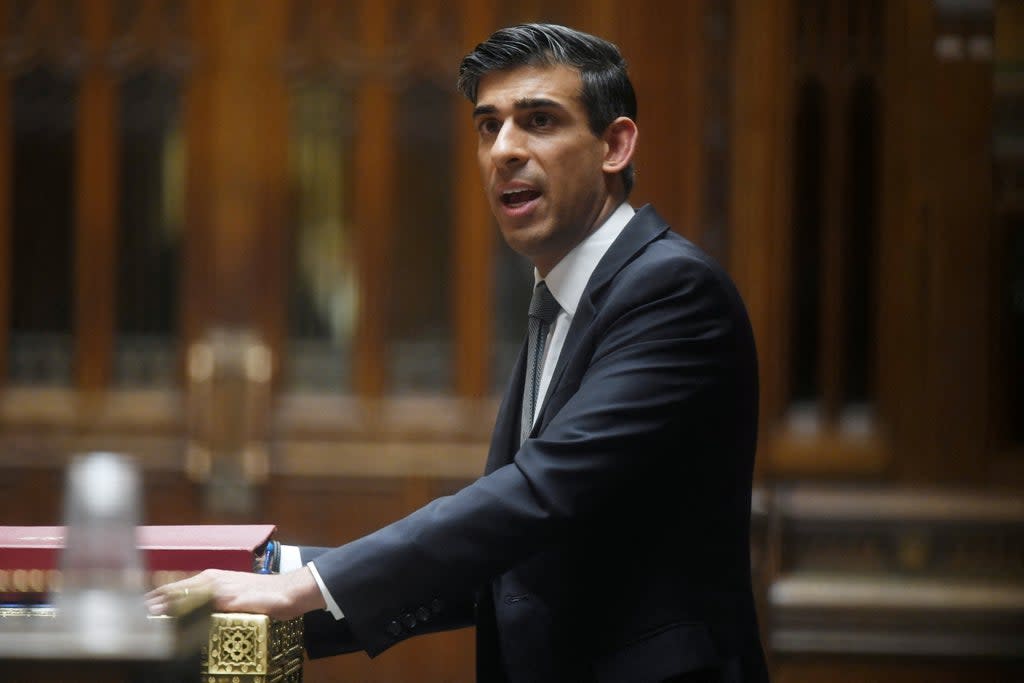Voices: Rishi Sunak’s headache the day after he thought it had gone so well

- Oops!Something went wrong.Please try again later.
Rishi Sunak had a rough day after the day before. He was asked about his father-in-law’s company’s operations in Russia, the definition of a woman and the kinds of bread his family eats. And also the hardship being suffered by people on benefits and the state pension.
It was a change of mood from the cheerfulness with which he delivered the spring statement yesterday. Towards the end of his speech, after he had announced what he clearly thought were the two brilliant political strikes – cancelling most of the national insurance rise this year and promising a tax cut in 2024 – he couldn’t suppress a triumphant smile.
It wasn’t long after he had sat down, to be patted on the shoulder unconvincingly by the prime minister, however, that journalists found the page in the Office for Budget Responsibility forecast that said the drop in average disposable income this coming financial year would be the biggest since the war.
And it wasn’t long after that that the Joseph Rowntree Foundation produced a chart analysing the measures in the statement, showing that the failure to raise benefits and the state pension by current inflation rather than the rate seven months ago will cut the incomes of the poorest by 5 per cent, while those higher up the income scale will lose less.
Until then, the worst criticism that Sunak had had to endure was from Jacob Rees-Mogg, the minister for Brexit opportunities, and Kit Malthouse, the police minister who is entitled to attend cabinet, at that morning’s cabinet meeting. They both suggested cuts in public spending instead of the national insurance rise.
The significance of this exchange was not the power of their fantasy economics, but that ministers seem to see the cabinet as a public forum in which to air their differences with each other.
Sunak, it is reported, said he understood their concerns but the government was committed to its manifesto pledges. In other words: Don’t be so daft; I have a cleverer idea than that. Because tax revenues have been higher than expected, I can get rid of most of the national insurance increase by raising thresholds – and keep our spending promises.
The chancellor was confident that he could see off the intellectual challenge from the punk Thatcherites on his own side, who are demanding bigger tax cuts while denying that they can be paid for either by more borrowing or by a return to the “austerity” of the Cameron-Osborne years.
What he was not expecting was the ferocity of the media response to the immiseration of the poor. Nor did he appear to be expecting questions about his wife’s business interests or about gender identity. To be fair, he seemed to have done some homework to prepare for a shopping question, saying that he had noticed a loaf of seeded bread had gone up from about £1 to £1.20.
That is a basic precaution required of the richest member of the Commons – as was his dead-bat response to questions about Infosys, the software company founded by his wife’s father, N R Narayana Murthy. Asked whether Infosys was complying with sanctions against Russia, he said: “I have absolutely no idea because I have nothing to do with that company.”
To keep up to speed with all the latest opinions and comment, sign up to our free weekly Voices Dispatches newsletter by clicking here
In a tetchy series of morning interviews, he also found it hard to answer the gotcha question of our day: “What is a woman?” He said he couldn’t remember exactly what the prime minister said yesterday but he agreed with it.
But the really hard part of his post-Budget interviews was explaining why his spring statement did so little to help the poor. Before Sunak’s speech, I wrote that he was essentially a New Labour chancellor, raising taxes to improve public services while protecting the poor. He seems to have forgotten the last bit.
Given that the main measures in the statement had been leaked in advance, I assumed that reports of a restoration of part of the uplift in universal credit were accurate. I had underestimated Sunak’s cynicism. He and Boris Johnson are Blairites, but only up to a point. They are all for higher public spending on the NHS, schools and the police, and they are prepared to face down the unelectable austerity-Tories, but they are, when it comes down to it, not Labour. New Labour was often embarrassed about redistribution to the poor, but it did it by stealth.
I thought Sunak might at least protect those millions of old people who rely on the state pension, but no. He appears to take a similar line to George Osborne: that people on welfare don’t vote Tory, so they will just have to suffer. The other cynical calculation is that Labour is wary of appearing to be the party of benefit claimants, so all credit to Rachel Reeves, the shadow chancellor, for insisting on Budget Day Two that benefits and the state pension should have been uprated to account for today’s inflation rate, which is, after all, only bringing forward next year’s uprating.
Sadly, I fear that Sunak’s callous cynicism is justified, in that the Conservatives will pay a small price at the next election for his callousness this week.

